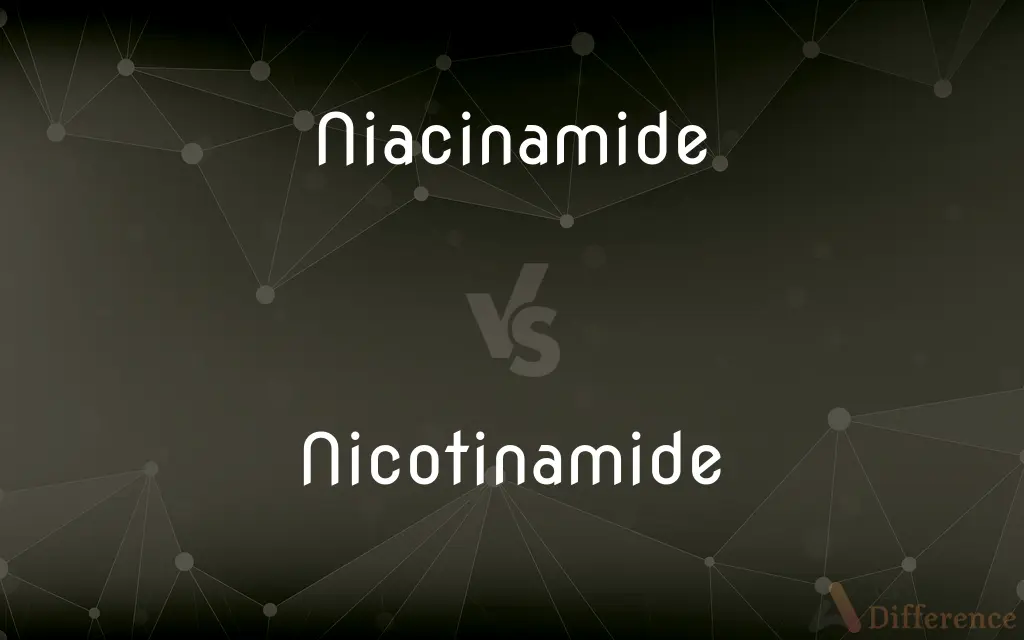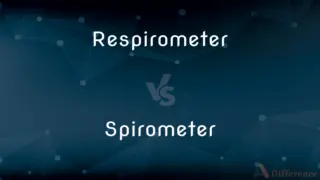Niacinamide vs. Nicotinamide — What's the Difference?
By Tayyaba Rehman — Updated on May 9, 2024
Niacinamide and nicotinamide are the same compound, also known as vitamin B3, important for skin health, metabolism, and DNA repair.

Difference Between Niacinamide and Nicotinamide
Table of Contents
ADVERTISEMENT
Key Differences
Niacinamide and nicotinamide both represent the same chemical compound, which is the amide form of vitamin B3. They are interchangeable names for the molecule that plays a critical role in cellular energy production in the body. Both terms describe a compound that is vital for numerous biological processes, including the conversion of food into energy.
Niacinamide and nicotinamide are commonly found in skincare products due to their numerous benefits for the skin. Both names refer to a substance that can help reduce the appearance of fine lines, enlarged pores, and uneven skin tone. They are favored ingredients in cosmetics due to their anti-inflammatory properties and ability to boost the skin's natural barrier.
Niacinamide and nicotinamide, when found in supplements, support overall health, particularly metabolic function and DNA repair. Both terms denote a nutrient that assists enzymes in the release of energy from carbohydrates, fats, and proteins. Additionally, they play a role in cell signaling and DNA repair, offering numerous health benefits.
In the context of skincare and health supplements, there's no distinction between niacinamide and nicotinamide. They are identical in chemical structure and function. So, whether a product label mentions niacinamide or nicotinamide, it refers to the same beneficial compound.
Comparison Chart
Chemical Identity
Form of vitamin B3
Identical to niacinamide
ADVERTISEMENT
Common Usage
Skincare, supplements
Skincare, cancer prevention research
Benefits
Improves skin texture, reduces acne
DNA repair, reduces cancer risk
Side Effects
Minimal at low doses
Similar, can cause flushing at high doses
Availability
Widely available in creams, serums
Commonly found in oral supplements
Compare with Definitions
Niacinamide
A molecule that supports DNA repair in cells.
Niacinamide plays a role in preventing DNA damage and mutations.
Nicotinamide
A nutrient assisting in metabolic functions.
Nicotinamide is vital for the metabolism of fats, carbohydrates, and proteins.
Niacinamide
A compound that assists in cellular energy production.
The body uses niacinamide to convert food into energy.
Nicotinamide
A compound that plays a role in cell signaling.
Nicotinamide is integral for proper cellular communication.
Niacinamide
A substance that can reduce skin inflammation.
Niacinamide serums can help calm redness in irritated skin.
Nicotinamide
A molecule beneficial for skin barrier enhancement.
Using a nicotinamide-infused moisturizer can improve skin hydration and barrier function.
Niacinamide
The amide form of vitamin B3.
Niacinamide can be found in many over-the-counter vitamin supplements.
Nicotinamide
The amide derivative of niacin or vitamin B3.
Nicotinamide is essential for various enzymatic reactions in the body.
Niacinamide
A water-soluble vitamin important for maintaining skin health.
Niacinamide is often added to lotions for its moisturizing benefits.
Nicotinamide
A component in skincare known for anti-aging properties.
Many anti-aging creams contain nicotinamide to target wrinkles.
Niacinamide
A beneficial ingredient in skincare products.
Niacinamide is praised for its ability to minimize pores.
Nicotinamide
Niacinamide or nicotinamide (NAM) is a form of vitamin B3 found in food and used as a dietary supplement and medication. As a supplement, it is used by mouth to prevent and treat pellagra (niacin deficiency).
Niacinamide
Used in cosmetics for its anti-aging properties.
Many anti-aging creams highlight niacinamide as a key ingredient.
Nicotinamide
Can prevent certain skin cancers when used as a supplement.
Daily supplements of nicotinamide may lower skin cancer risk.
Niacinamide
Reduces environmental damage to the skin.
Skincare products with niacinamide help protect against pollution.
Nicotinamide
A form of vitamin B3 used in dermatology.
Nicotinamide is prescribed for its benefits in treating eczema.
Niacinamide
Improves the barrier function of the skin.
Niacinamide is included in facial moisturizers to strengthen skin’s resilience.
Nicotinamide
Integral for DNA repair and cellular communication.
Researchers study nicotinamide for its potential in cancer therapy.
Niacinamide
Helps convert food into energy in the body.
Niacinamide supplements are recommended to boost metabolism.
Nicotinamide
Protects against oxidative stress.
Nicotinamide is effective in reducing oxidative damage in cells.
Niacinamide
The amide of niacin (nicotinic acid), called also nicotinamide. It was at one time called vitamin B3, and can function to relieve nicotinic acid deficiency. Chemical formula C6H6N2O, chemically it is 3-pyridinecarboxamide.
Nicotinamide
The amide of nicotinic acid (or niacin).
Niacinamide
(organic compound) The amide of niacin.
Nicotinamide
Enhances the efficacy of the immune system.
Nicotinamide supplementation is known to boost immune health.
Common Curiosities
Which term, niacinamide or nicotinamide, is more common in skincare?
Both terms are used interchangeably, but niacinamide might be slightly more prevalent on skincare product labels.
Do niacinamide and nicotinamide serve the same function in the body?
Yes, both niacinamide and nicotinamide play crucial roles in cellular energy production, DNA repair, and other metabolic processes.
Are the benefits of niacinamide and nicotinamide the same in skincare?
Absolutely, since niacinamide and nicotinamide are synonymous, they offer identical benefits in skincare, such as reducing inflammation and improving skin barrier function.
Is niacinamide the same as nicotinamide?
Yes, niacinamide and nicotinamide refer to the same chemical compound, the amide form of vitamin B3.
Can I replace niacinamide with nicotinamide in a product's ingredient list or vice versa?
Yes, since they refer to the same compound, you can use either term interchangeably.
How do niacinamide and nicotinamide benefit the skin?
Both niacinamide and nicotinamide offer anti-inflammatory properties, reduce the appearance of fine lines, and help strengthen the skin's natural barrier.
Do niacinamide and nicotinamide have the same side effects?
Since they are the same compound, any side effects associated with one would also be associated with the other.
Can both niacinamide and nicotinamide be used for skin health?
Yes, both are beneficial for skin health but are used in different product forms.
Can I find both niacinamide and nicotinamide in vitamin supplements?
Yes, whether labeled as niacinamide or nicotinamide, it's the same beneficial compound in vitamin supplements.
Are there any side effects of using niacinamide topically?
It is usually well tolerated, though some may experience mild irritation.
Is niacinamide an essential nutrient?
Yes, it is a form of vitamin B3, which is essential for overall health.
Is there any difference in the chemical structure of niacinamide and nicotinamide?
No, niacinamide and nicotinamide have the same chemical structure: C₆H₆N₂O.
Are niacinamide and nicotinamide the same?
Yes, they refer to the same chemical compound, vitamin B3.
What are the main benefits of niacinamide in skincare?
Niacinamide improves skin texture, moisture, and reduces signs of aging.
Can niacinamide help with acne?
Yes, it has anti-inflammatory properties that help reduce acne.
What types of products contain nicotinamide?
Nicotinamide is commonly found in oral supplements and some skincare products.
How do niacinamide and nicotinamide differ in their effects?
They provide similar health benefits, given that they are the same compound.
Can I use niacinamide and nicotinamide together?
Since they are identical compounds, they can be used interchangeably.
Why is niacinamide popular in skincare products?
Its benefits in improving skin barrier function and reducing environmental damage make it popular.
How does nicotinamide help in cancer prevention?
Nicotinamide has been shown to help prevent certain forms of skin cancer.
How is nicotinamide used in medical research?
It is widely researched for its role in cellular repair and cancer prevention.
Can nicotinamide reduce aging signs?
Yes, it has properties that help in reducing signs of aging.
Is one term, either niacinamide or nicotinamide, more scientifically accurate?
No, both terms are scientifically accurate and represent the same compound. The choice of term is often a matter of preference.
Is niacinamide safe for all skin types?
Yes, it is generally safe and beneficial for all skin types.
What is the role of nicotinamide in energy metabolism?
It helps in converting nutrients into usable energy within the body.
Share Your Discovery

Previous Comparison
Respirometer vs. Spirometer
Next Comparison
Bogie vs. BoogieAuthor Spotlight
Written by
Tayyaba RehmanTayyaba Rehman is a distinguished writer, currently serving as a primary contributor to askdifference.com. As a researcher in semantics and etymology, Tayyaba's passion for the complexity of languages and their distinctions has found a perfect home on the platform. Tayyaba delves into the intricacies of language, distinguishing between commonly confused words and phrases, thereby providing clarity for readers worldwide.
















































